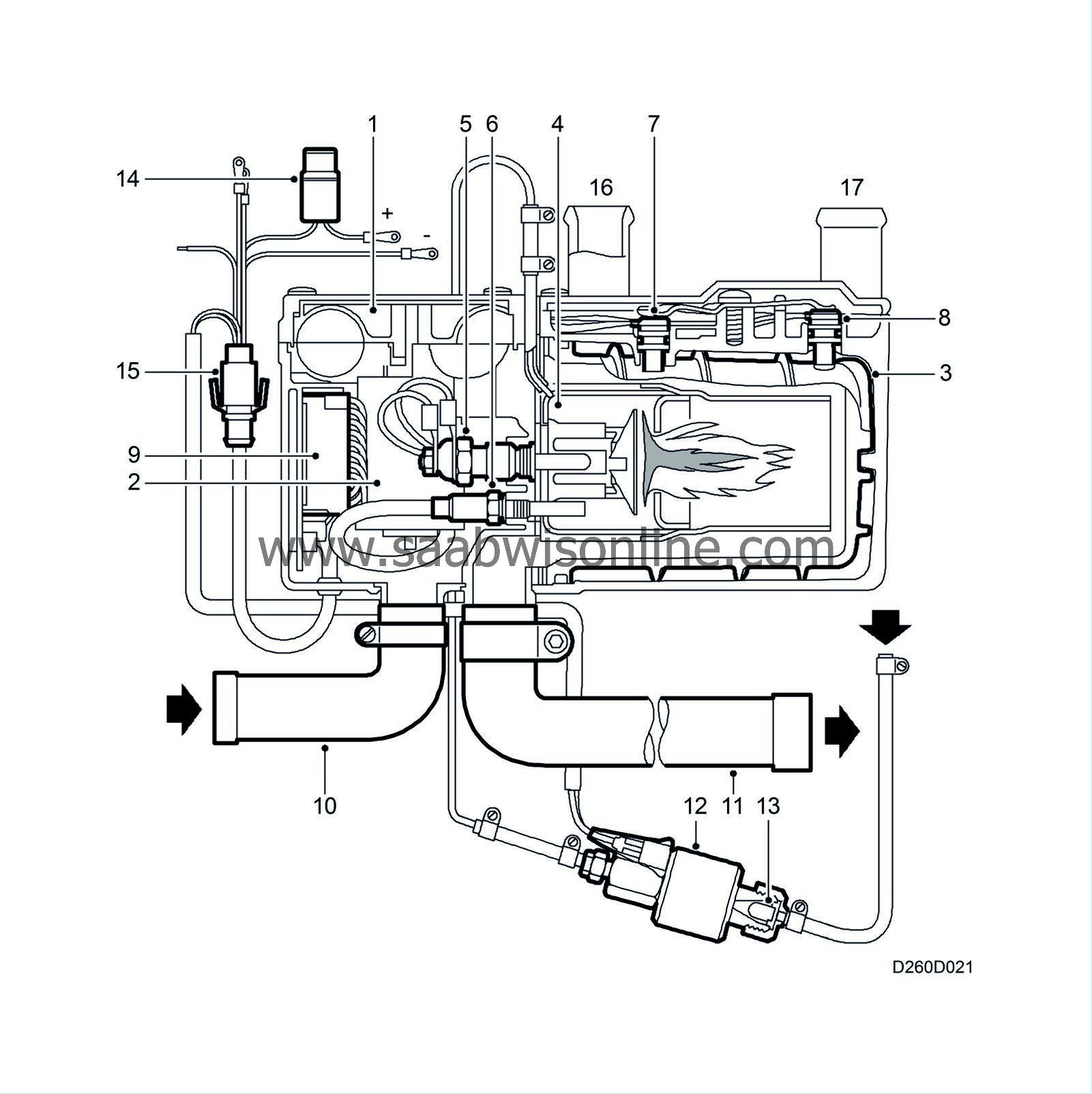Auxiliary heater
| Auxiliary heater |
| 1. |
Blower fan
|
|
| 2. |
Blower fan motor
|
|
| 3. |
Heat exchanger
|
|
| 4. |
Combustion chamber
|
|
| 5. |
Glow plugs
|
|
| 6. |
Flame detector
|
|
| 7. |
Coolant temperature sensor 1
|
|
| 8. |
Coolant temperature sensor 2
|
|
| 9. |
Control module
|
|
| 10. |
Air inlet
|
|
| 11. |
Exhaust pipe
|
|
| 12. |
Fuel pump
|
|
| 13. |
Fuel filter
|
|
| 14. |
Fuse
|
|
| 15. |
8-pin connector
|
|
| 16. |
Coolant outlet
|
|
| 17. |
Coolant inlet
|
|
| Functions |
The heater combustion chamber is situated so that it is completely surrounded by the heat exchanger, which means that the thermal energy can be utilized very efficiently.
The diesel heater has a fan to regulate the supply of air to the combustion chamber and control the output of the heater together with the fuel pump.
After starting the heater, the fan will first run at full output to evacuate the combustion chamber, after which the glow plug will be activated. About 45 seconds after the glow plug has been activated, the fuel pump will start at half speed and shortly afterwards, the fan will start and begin to accelerate to half speed.
When the flame temperature sensor signals that combustion has started (temperature in combustion chamber exceeds 80°C (176°F)) the fan and pump run at full speed and the heater operates at full power, i.e. 5000 W.
When the control module receives a signal from coolant temperature sensor 1 that the coolant has reached 86°C (187°F), the pump and fan decrease to half speed and heater output is lowered to 2400 W. If the coolant temperature drops below 75°C (167°F), the heater returns to full power. If the coolant temperature exceeds 86°C (187°F), the heater will shut off and the fan will air the combustion chamber. The heater will start again aver 130 seconds if the temperature limit for "heater on" has been reached.
| Safety functions |
Before start, the blower fan will cold blow the combustion chamber. If the temperature of the combustion chamber should not drop below 70°C (158°F) within 240 seconds, the heater will shut off.
If the control module does not receive a signal from the flame temperature sensor that the flame has been ignited (temperature in combustion chamber exceeds approximately 75°C (167°F) for 120 seconds) the start attempt is interrupted. A new attempt is permitted but if this fails as well, no further attempts are made during that driving cycle. If 3 start attempts have failed, the heater is blocked and no start attempts are permitted before the diagnostic trouble codes have been deleted.
Should the temperature difference between the coolant temperature sensors exceed 25°C (77°F), due to insufficient flow through the heater, for example, the control module reacts and interrupts operation before critical temperature levels are reached.
If any of the sensors detects a temperature exceeding 125°C (257°F), the control module shuts down the fuel pump. If the temperature should continue to rise to 130°C (266°F), the control module cuts off the power to the fuel pump drive, if this has not previously been done by the control module microprocessor.
If overheating has occurred 3 times, the heater will be blocked and not allowed to start until the DTCs have been cleared.
The heater measures the +30 voltage on its own +30 connection each time it starts. If the voltage is lower than 12 V, the heater does not start. A new attempt to start is made after a further 10 seconds. The +30 voltages is continuously measured while the glow plug is on.



